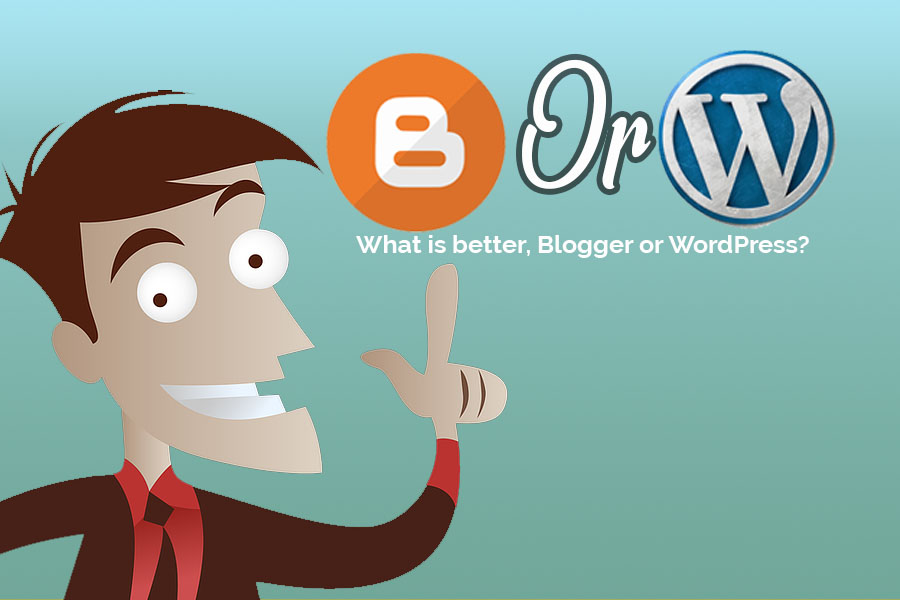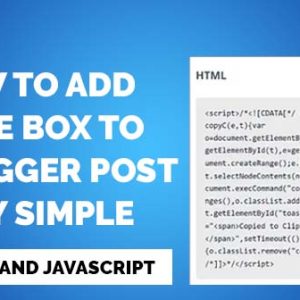Blogger or WordPress: If we go into blogging and websites, then we can surely find several alternatives to make it dynamic, or above all, easy for all those users who remain terrified with the very idea of touching a line of code.
There are two famous options among all of them; seeing which one to choose between Blogger and WordPress, we define and put them in a ring to know what will be better for creating your website.
Table of Contents
- What is Blogger
- What is WordPress
- Main differences between WordPress vs Blogger
- Which one is more user-friendly?
- Which one is better for e-commerce?
- Blogger or WordPress-Which is more secure?
- Which one serves better for the purpose of SEO?
- Which one is more used?
- Conclusion
What is Blogger

Blogger is a free blog publishing tool and blog hosting web service owned by Google, established in August 1999. It so happens that it is one of the oldest blogging platforms and is still among the most popular ones today. Blogger offers an array of features that can help in creating, managing, and publishing online content. These include but are not limited to Text Editing Tools, Tags, Multi-Media Files, Interactive Widgets, Template Customization, and an intuitive interface to create content and manage your blogs. They offer different options for getting content out into the world, such as SEO Optimized, Content Marketing, and Social Media Promotion, among many others. Furthermore, Blogger also allows users to publish content on multiple blogging platforms simultaneously. You will be able to maintain several blogs from the same user without any inconvenience whatsoever.
Note that you can get started with blogging absolutely free of cost-the only thing you’ll need is a Google/Gmail account to log in, and that just about covers it.
Once the blog is set up, customization and creation of content therein, though somewhat limited, are user-friendly for anyone without them having to have any technical knowledge.
What is WordPress
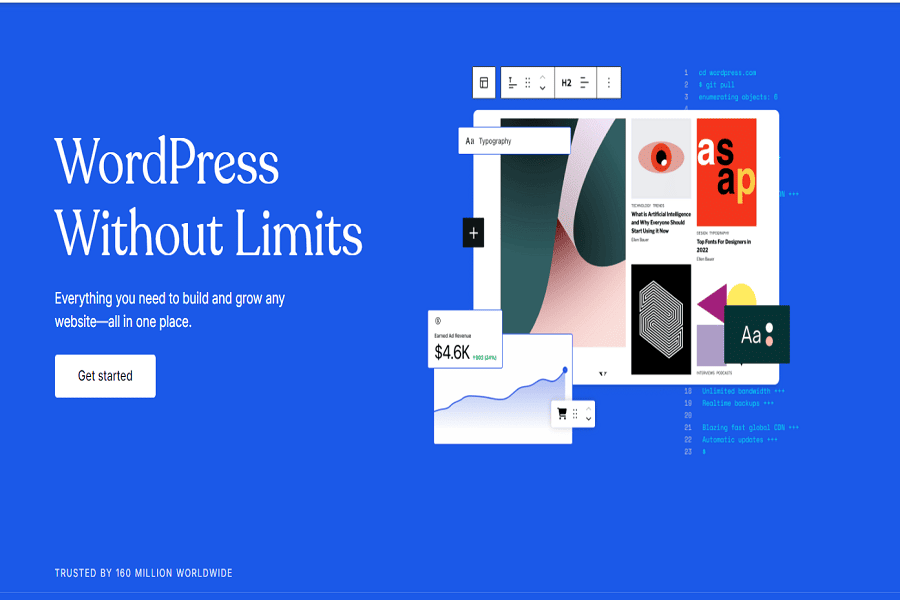
WordPress is a type of content management system whereby users can easily create and manage a website. It is open-source software meaning that it is free and can be modified by developers and advanced users. Moreover, it has the biggest community of users and developers in its contribution to the improvements of the software by offering its support and solutions to the users.
It finds general applications in blogging, corporate websites, and e-commerce. The wide varieties include different WordPress templates that can be applied to give your website a unique look. Other varieties include the use of WordPress plugins, which are meant to add extra functionality to your site. Third-party integrations are pretty easy to implement with other online platforms and services, such as Google Analytics in WordPress, Mailchimp in WordPress, and many others.
First, it is relevant to point out that starting our project in WordPress, there are two alternatives: wordpress.com and wordpress.org. In principle, the most notable difference is that, via the “.org” section, we can manage a WordPress platform as a service without having to worry about web hosting.
While, in case of “.com”, we can download the CMS and then install it at any place.
Main differences between WordPress vs Blogger
Undoubtedly, when overcome with curiosity to create our personal blog, we will instantly ask ourselves the question: Which should I use? Which one is better? Defining which one is better than the other means discarding the very characteristics that make each one of them attractive.
We are going to review in detail several main differences between WordPress and Blogger.
Cost: As we saw when defining both services, both Blogger and WordPress have free plans, but in the case of WordPress, you’ll need Hosting and a domain.
Customization: This ranges from the whole look and feel to the depth at which we want to personalize our blog. To that effect, WordPress allows more flexibility in customization and personalization, with a wide range of templates and both free and paid plugins available. Blogger On the other hand, the scope for customization is limited, since it is rather restricted functionality-wise.
Now, to explain this aspect in detail: from WordPress, any given structure could be created and the styles applied in order to make it look as we have imagined. Being more reduced and compact with only what is necessary, this aspect would turn out a bit more cumbersome for Blogger users who lack the most basic knowledge in code edition to do this kind of adaptation.
Scalability: While a Blogger site can be scaled up to a full-fledged website with a number of adaptations, the flexibility of WordPress is unmatched, and it can have the dynamism to change the blog into anything you want-whether an informative site, landing pages, or even a shopping cart.
Ownership of Content: WordPress allows users to retain more control over their content than Blogger can offer, with the added bonus of designing one’s website. Blogger allows users to have less control over their content and be hosted on a Blogger subdomain.
Monetization: Above all, Blogger, coming from Google, has default integration with AdSense, an online advertising program provided by Google, in which website publishers insert advertisements on their web pages and earn money when people click on them.
It might be also associated with advertising programs, including AdSense and many others, but it does not come by default in any easy manner; many times, having to resort to plugins or code.
Community: Being such a long-time online Blogger supported by Google, its community is loyal and constant; however, it cannot be compared to the community which surrounds WordPress both as a service and much less as a free CMS, which would potentially develop all the possibilities of what we want to this point they can’t be compared since they focus on different points of view, Blogger like a blog manager and WordPress like a multipurpose tool for websites.
Which one is more user-friendly?
Which one is easier to work with remains up to the user’s skills and preferences. Some may find Blogger easier to use because it has more intuitive interfaces, though very limited. Keep in mind that Blogger has much more limited management options, which makes it easier for users not to get overwhelmed and perform certain actions within their blog in an easier way.
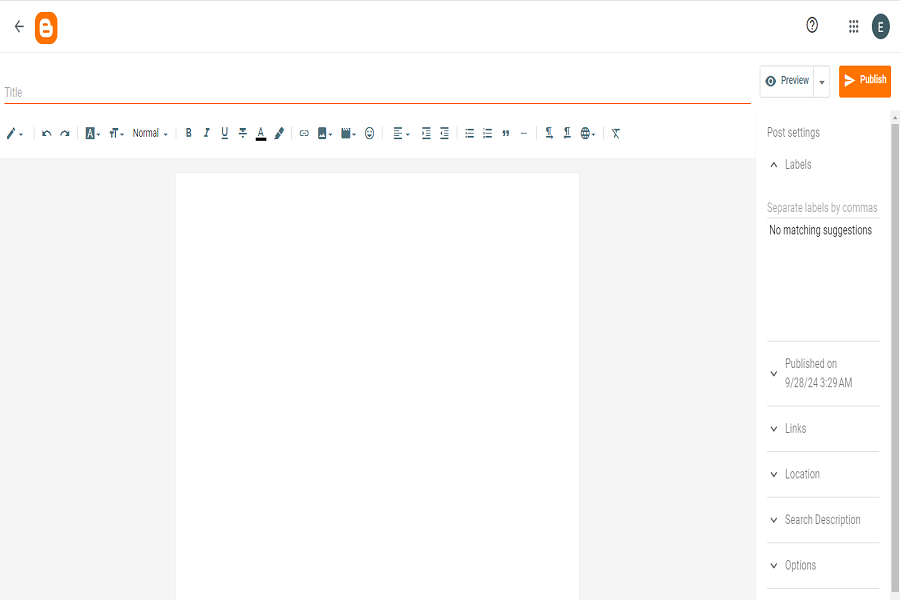
Whereas other users may find WordPress more agreeable to work with, as it is more flexible and has the potential for a great deal of customization. Noting that WordPress can be as user-friendly as well as complex as the user has configured it. We could compare a basic blog site with a property sales site, and from the control panel both WordPress would be very different from each other.
Considering these cases, the learning curve in WordPress can be much steeper compared to Blogger, but with the caveat always of everything depending on what kind of a user one is.
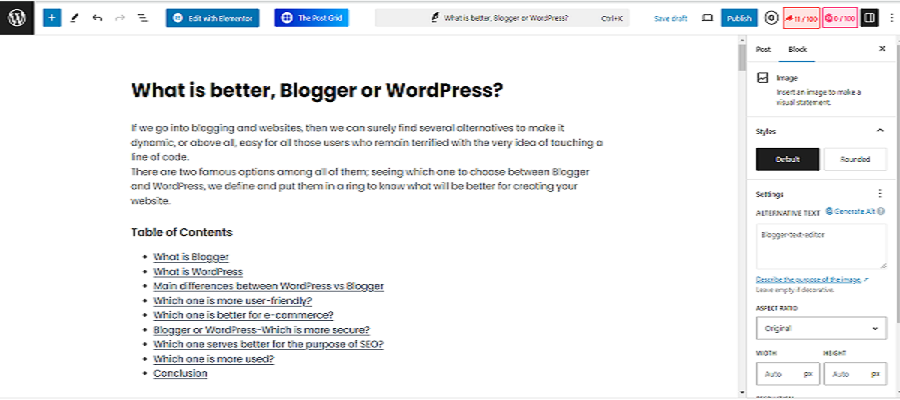
Generally speaking, Blogger will be easier to use by those who desire to run a blog with almost no customization, whereas WordPress does the job if you are looking for something more comprehensive and scalable. In any case, both have active communities, which-as we mentioned above-offer resources and support so that with a little patience and determination, one can learn in due time to use these systems.
Which one is better for e-commerce?
Well, when it comes to comparing WordPress or Blogger in regard to selling products, services, etc., there is not much doubt. While Blogger can implement methods in which you can offer products and then redirect your potential clients to contact you and then manage the sale, WordPress is way ahead in this area.
The positive fact of obvious popularity is that there are plugins available, and by installing them we may enable a shopping cart on our blog. This constitutes one of the most used tools for this purpose.
Plugins like WooCommerce turn what would be a vanilla blog into a sales site, complete with product management and shipping and payment gateways. This makes WordPress indisputably the best option in this area.

Woo Commerce is designed for WordPress, and with that comes the potential of turning a normal website into a full e-commerce website. This plugin adds a whole range of functionalities to effectively and efficiently create and manage various products and services.
With WooCommerce installed, we immediately have at our disposal a package of tools for the creation of product catalogs, inventory management, establishment of payment and shipping options, plus very scrupulous follow-up of store sales and performance.
Undeniably, WooCommerce is the ultimate choice in WordPress to build and efficiently manage an online store.
Blogger or WordPress-Which is more secure?
No doubt, the security aspect of managing each and every web platform is an extremely complex topic. As far as the two platforms being compared here, Blogger and WordPress, their respective flexibilities play an important role in implementing good security practices. However, no platform can claim to offer unbreakable security.
Many and varied are the factors that go into making a website secure. When using online platforms-where we have no control of the technical aspects, such as the server-added security is applied. Though no platform can be perfect or full-proof, the guarantee provided by Blogger, backed up by Google, adds a layer of confidence.
All considerations certainly increase when we take responsibility for the management of the environment where the website has been deployed. First, configuration and maintenance of the server holding the website are a certain guarantee of the establishment against possible threats.
Specific to WordPress security, externally depended elements like plugins and themes, their configuration is super important in repelling potential breaks and vulnerabilities. The management of user accounts and the way their information is managed, permissions and attributions on the platform become critical:
Which one is more secure? The answer to that remains indistinct, since both come with their virtues. However, on Blogger, we are likely to worry less about the responsibility that comes with keeping a WordPress site safe and secure from threats.
Which one serves better for the purpose of SEO?
While both are equipped with ways to positively optimize SEO, WordPress is, in general, better for SEO compared to Blogger. That is because once again, at WordPress, the options are more dynamic and allow for much greater control over the structure and content of a website, which makes it easier to optimize SEO.
On top of that, WordPress has a very active developer community when it comes to creating plugins, among which are SEO plugins that allow better visibility in search engines.
Blogger does not have the flexibility that we have already mentioned in this article, but let’s remember that it is a tool provided by Google itself, and the management of its content is forecasted to be as smooth as possible for blogging facilitation.
In the light of the above, WordPress remains the most recommended if all you want is a place to create your blog and ensure it will rank in the best possible way. Since it boasts powerful features with a vast community of supporters, it indeed holds an edge. However, SEO success-irrespective of the platform which might have been used-would depend on many other factors: quality of the content, the structure and usability of the website, and optimization of the user experience.
Which one is more used?
WordPress is the most prevailing blog publishing platform in the world. In the study updated during the year, WordPress is the CMS that represents more than 40% of all the websites that exist on the internet and then consolidates to be the most used for anyone who wants to share content online or build his website.
While perhaps not on the same scale of usage, Blogger does hold a significant place in the digital atmosphere. This is because, since 1999, an active and attached community has grown, which also outlived the test of time. More than two decades in the making, the solidity of this community speaks volumes about a strong bond of trust and loyalty in its users, who perceive Blogger as unfailing and stable.
It is a place where, regardless of your experience with the platform, you will always have an extremely important ally in that great community of WordPress. It’s one of those communities that gives, besides guidance, support to solve any questions that might emerge during the creation and management of a blog.
We cannot ignore another critical factor-the one that represents the flexibility inherent to WordPress for the purpose of customizing and optimizing a website. In effect, being able to make a site to your liking and adapt it to the needs of each of its users is indeed one of the hallmarks of this platform.
While Blogger does allow for customization to a certain extent, achieving those very same results requires significantly more hard work with deeper technical knowledge. WordPress, in turn, makes this task much easier with its native tools, such as the Gutenberg editor, whereby one can create websites intuitively and with ease.
Conclusion
Nowadays, we have the privilege to choose among a big number of tools available, and with this big amount, an open opportunity to choose a platform fitting our needs for developing projects, content creation, or just to express an idea in an impersonal digital space. Among the options provided, WordPress and Blogger are the two options that were chosen to be analyzed closely in the present article.
Therefore, the key question would be: when one has to choose between these two for making a personal blog, would one go for something quite simple, fast, and free, or does one enjoy making something highly customizable with the possibility of scaling it to a website with advanced features?
WordPress is far more attractive on account of the level of flexibility: higher configuration and adaptation capabilities. This is a CMS that not only allows blogging to be created in a very neat and effective way but also doesn’t suffer from the inability that Blogger might allow since it’s a somewhat more “closed” platform; this might lead to limitations concerning not only personalization but also scalability.
Such flexibility of WordPress is testified to by the mere fact that it can fit each user’s needs but also grow with the project. Unlike Blogger, WordPress has the possibility of growing as big as the blogger needs with the blog or project, overcoming obstacles so far as it keeps on growing and the need to enrich functionalities and customize the experience emerges with such growing demands.
Briefly, with relation to choosing between WordPress or Blogger, this will depend on the goals and, above all, the taste of each one. If you look at simplicity, speed, and free, you can bet for Blogger. On the other hand, if you want personalization and adaptability that contemplates scalability in the future towards a more complete website, WordPress is ideal.
You May also Like:

